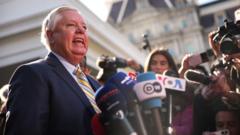Most Republicans back President Trump's actions towards Ukraine's Zelensky following a tense Oval Office meeting, while others voice concerns over US foreign policy and accusations of undermining crucial alliances.**
Tensions Rise After Trump-Zelensky Meeting: Mixed Reactions From Republicans**

Tensions Rise After Trump-Zelensky Meeting: Mixed Reactions From Republicans**
Following a heated confrontation between Donald Trump and Ukrainian President Volodymyr Zelensky, Republicans express both support and disapproval of the encounter, highlighting divisions within party lines.**
In a dramatic turn of events within US politics, most Republicans have rallied behind President Donald Trump and Vice-President JD Vance after their contentious meeting with Ukrainian President Volodymyr Zelensky in the Oval Office. The clash has ignited fierce debate within the party itself, with some members supporting Trump's approach while others criticize it as detrimental to US allies.
Prominent Republican Senator Lindsey Graham suggested that Zelensky should resign, alleging that the confrontation could jeopardize future military aid to Ukraine. Conversely, a fellow senator accused Trump of leaning too heavily towards Russia, raising alarms about possible repercussions for US relations with Kyiv. Zelensky was reportedly dismissed without finalizing a deal to collaboratively exploit Ukraine's rich mineral resources, which could have added value to US-Ukraine relations.
Zelensky received a more favorable welcome from UK Prime Minister Keir Starmer shortly after his Oval Office experience, highlighting a contrast in international reception. In London, Zelensky urged the US to bolster its support and expressed his willingness to commit to the minerals deal contingent on secured guarantees of safety and support.
Trump's remarks suggested a shift in approach towards the ongoing conflict, proposing territorial concessions by Ukraine to achieve peace and engaging in discussions with Russian President Vladimir Putin. He has also threatened high tariffs and additional sanctions against Russia should the conflict continue unabated. After the meeting, Trump asserted that Zelensky had "overplayed his hand" and indicated a preference for the situation to either resolve or allow Ukraine to confront the challenges independently.
National Security Adviser Mike Waltz, present in the Oval Office during the altercation, dismissed Zelensky's objections as an attempt to "fact-check," likening the situation to an argument with an "ex-girlfriend." While many Republicans in Congress have sided with Trump, lending their support for his confrontational tactics, others, like Alaska Senator Lisa Murkowski, expressed distress over the administration's apparent shift away from supporting traditional allies in favor of a softer stance towards Russia.
Certain Republican representatives have lamented that the meeting was a squandered chance for both nations, emphasizing Ukraine's desire for independence and alignment with Western values, while Democrats condemned the exchange and criticized the Republican leadership's handling of the situation.
Senate Minority Leader Chuck Schumer accused Trump and Vance of acting in Putin's favor, while others stressed that Zelensky deserves proper respect for his leadership amid ongoing conflict. These reactions underscore a growing rift within the Republican party regarding foreign policy, particularly concerning support for Ukraine in its struggle against Russian aggression.
Prominent Republican Senator Lindsey Graham suggested that Zelensky should resign, alleging that the confrontation could jeopardize future military aid to Ukraine. Conversely, a fellow senator accused Trump of leaning too heavily towards Russia, raising alarms about possible repercussions for US relations with Kyiv. Zelensky was reportedly dismissed without finalizing a deal to collaboratively exploit Ukraine's rich mineral resources, which could have added value to US-Ukraine relations.
Zelensky received a more favorable welcome from UK Prime Minister Keir Starmer shortly after his Oval Office experience, highlighting a contrast in international reception. In London, Zelensky urged the US to bolster its support and expressed his willingness to commit to the minerals deal contingent on secured guarantees of safety and support.
Trump's remarks suggested a shift in approach towards the ongoing conflict, proposing territorial concessions by Ukraine to achieve peace and engaging in discussions with Russian President Vladimir Putin. He has also threatened high tariffs and additional sanctions against Russia should the conflict continue unabated. After the meeting, Trump asserted that Zelensky had "overplayed his hand" and indicated a preference for the situation to either resolve or allow Ukraine to confront the challenges independently.
National Security Adviser Mike Waltz, present in the Oval Office during the altercation, dismissed Zelensky's objections as an attempt to "fact-check," likening the situation to an argument with an "ex-girlfriend." While many Republicans in Congress have sided with Trump, lending their support for his confrontational tactics, others, like Alaska Senator Lisa Murkowski, expressed distress over the administration's apparent shift away from supporting traditional allies in favor of a softer stance towards Russia.
Certain Republican representatives have lamented that the meeting was a squandered chance for both nations, emphasizing Ukraine's desire for independence and alignment with Western values, while Democrats condemned the exchange and criticized the Republican leadership's handling of the situation.
Senate Minority Leader Chuck Schumer accused Trump and Vance of acting in Putin's favor, while others stressed that Zelensky deserves proper respect for his leadership amid ongoing conflict. These reactions underscore a growing rift within the Republican party regarding foreign policy, particularly concerning support for Ukraine in its struggle against Russian aggression.





















